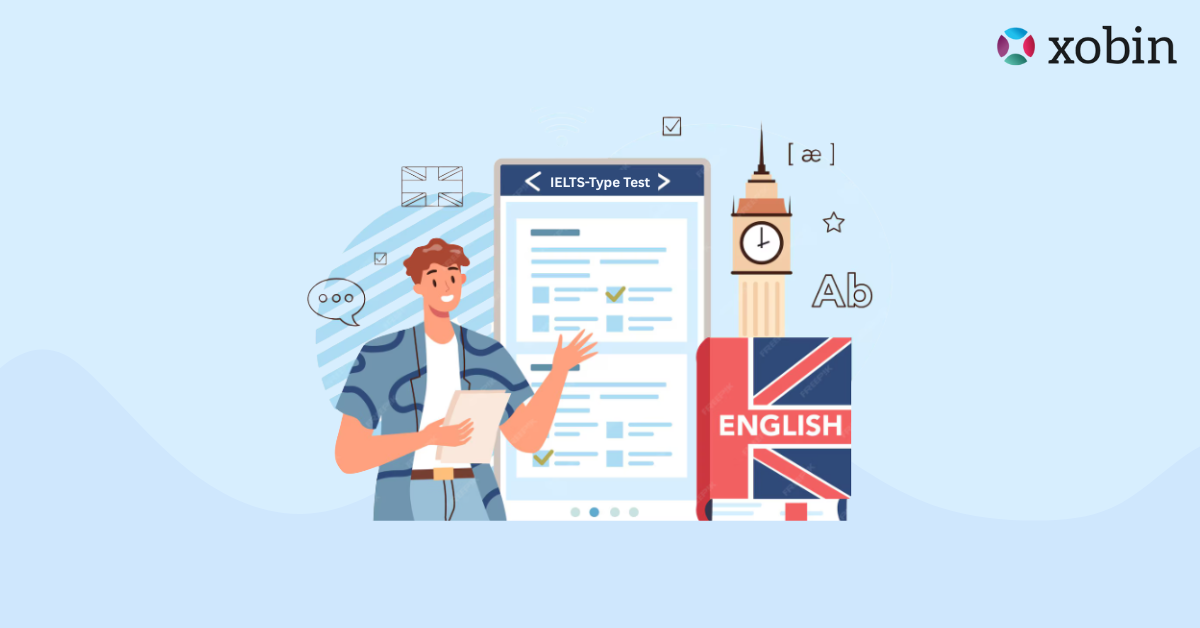Imagine a fast-growing company in India preparing to onboard a new team for its overseas projects. The candidates have impressive résumés and technical expertise, but during client calls, a small hiccup arises “miscommunication”. A simple misunderstanding over an email or a presentation can delay deals, strain partnerships, and affect business outcomes.
Table of Contents
This is not just one company’s challenge, it’s a reality for organizations worldwide. In today’s global hiring landscape, English proficiency has become more than a nice-to-have skill; it is the backbone of seamless collaboration. For HR leaders, ensuring every hire can confidently communicate with international clients, colleagues, and stakeholders is critical, it’s a business necessity.
Yet, relying only on traditional interviews or generic language tests often falls short. That’s why forward-thinking companies are embracing Online IELTS assessment tests. These modern tools bring scalability, accuracy, and data-driven insights, empowering recruiters to measure English communication skills with precision.
In this blog, we’ll uncover why companies prefer IELTS assessments in recruitment, how they work, and the measurable impact they bring in shaping global hiring strategies.
TL;DR – Key Takeaways!
- The IELTS assessment test helps companies evaluate candidates’ listening, reading, writing, and speaking skills for workplace communication.
- Global organizations use IELTS assessment in hiring to ensure cross-border teams collaborate effectively.
- Unlike traditional English tests, IELTS-type assessments focus on real-world communication and business contexts.
- Key skills measured include fluency, vocabulary, grammar accuracy, pronunciation, and IELTS writing evaluation and IELTS speaking evaluation performance.
- AI plays a vital role with automated scoring, NLP, and real-time analytics, ensuring fairness and scalability.
- Why companies prefer IELTS assessments: consistency, reduced hiring costs, improved candidate quality, and bias-free evaluation.
- Xobin’s Online IELTS-type communication assessments make language testing scalable, customizable, and integrated into recruitment workflows.
What are IELTS-Type Assessments?
An IELTS-type assessment is an online evaluation modeled after the International English Language Testing System (IELTS), which is globally recognized for measuring English proficiency. Unlike traditional language tests, these assessments are designed for corporate recruitment and focus on practical communication skills required in the workplace.
An online IELTS assessment test evaluates four key areas:
- Listening: Understanding accents, tones, and business conversations.
- Reading: Comprehension of business reports, emails, and professional content.
- Writing: Professional writing ability, often tested through IELTS writing evaluation tasks.
- Speaking: Assessing verbal communication and fluency via IELTS speaking evaluation modules.
For global organizations, these assessments act as a language screening hiring process, ensuring every candidate can operate confidently in diverse, multicultural environments.
How Companies Use IELTS-Type Assessments to Hire Global Talent
HR leaders often face challenges when hiring across borders. Miscommunication not only impacts team collaboration but also risks client relationships. This is why global companies use language testing at different stages of recruitment.
Here’s how organizations integrate IELTS assessment in hiring:
- Pre-screening Stage: Recruiters use an Online IELTS-type communication assessment tool to filter candidates before interviews, saving time and reducing hiring costs.
- Interview Preparation: By reviewing candidates’ language skills evaluation for global hiring, companies tailor interview questions to address real communication gaps.
- Role-Based Selection: For customer-facing roles like sales, support, or consulting, English proficiency test corporate recruitment becomes a non-negotiable step.
- Internal Mobility: Multinational firms use these tests to assess employees before promotions or relocations, ensuring smooth cross-border communication.
By embedding IELTS-type assessment benefits into the hiring funnel, companies maintain consistency in evaluating communication skills while reducing bias.
IELTS-Type Assessment vs Traditional English Tests
Most traditional English proficiency tests focus on grammar rules or vocabulary recall. While they serve as an academic benchmark, they often fail to measure workplace communication skills.
In contrast, an IELTS assessment test goes beyond textbook knowledge:
| Criteria | Traditional English Tests | IELTS-Type Assessments |
| Focus | Grammar & vocabulary | Real-world communication |
| Format | Multiple-choice, essays | Role-play, speaking, business writing |
| Use Case | Academic evaluation | Language proficiency test in recruitment |
| Flexibility | Paper-based or offline | Online IELTS assessment test with AI scoring |
| Reliability | Manual checking | Automated, bias-free evaluation |
For corporate recruitment, IELTS alternative assessments such as Xobin’s AI-driven assessments provide scalable, reliable, and context-driven insights.
Top Skills Measured in an IELTS-Type Assessment
Modern IELTS-type assessments go deeper than testing vocabulary. They evaluate skills directly linked to workplace English proficiency hiring.
- Fluency and Coherence: Can the candidate express ideas clearly without hesitation?
- Lexical Resource: Does the candidate use professional vocabulary suited for business contexts?
- Grammatical Accuracy: Are sentence structures correct and easy to understand?
- Pronunciation: Is the candidate’s speech understandable across cultures?
- Business Writing Skills: Emails, reports, and proposals tested through IELTS writing evaluation.
- Active Listening: Can the candidate follow instructions or conversations in real time?
These dimensions make language skills evaluation for global hiring more accurate and job-relevant compared to generic tests.
IELTS-Type Assessment Evaluation Criteria
For corporate decision-makers, understanding how these tests are evaluated is crucial. Unlike subjective interviews, an IELTS assessment relies on standardized criteria and AI-powered scoring systems.
Typical evaluation benchmarks include:
- Band Scoring Similarity: Just like IELTS, candidates receive scores across four sections (listening, reading, writing, speaking).
- AI-Based Consistency: Automated scoring ensures fairness, reducing human bias.
- Performance Insights: Recruiters get detailed reports highlighting strengths and weaknesses, enabling informed hiring decisions.
- Role-Specific Benchmarks: Customizable scoring aligned with industry requirements, making it suitable for customer service, consulting, or leadership roles.
With advanced communication skills assessments tools, companies gain data-driven visibility into candidates’ real-world communication readiness.
The Role of AI in IELTS-Type Assessments
AI has transformed language screening hiring processes by making them faster, scalable, and more precise. Here’s how:
- Automated Speech Recognition: AI analyzes tone, fluency, and accent in IELTS speaking evaluation tasks.
- Natural Language Processing (NLP): Used in IELTS writing evaluation, NLP checks grammar, coherence, and readability.
- Bias-Free Scoring: Unlike manual evaluations, AI ensures every candidate is assessed equally.
- Real-Time Insights: Recruiters access instant dashboards with candidate strengths, weaknesses, and benchmarks.
- Scalable Testing: With platforms like Xobin, companies can test hundreds of candidates simultaneously without compromising accuracy.
For English proficiency test corporate recruitment, AI ensures that assessments reflect real-world communication scenarios rather than just textbook exercises.
Why Global Companies Prefer Online IELTS-Type Assessments
The growing adoption of IELTS assessment test solutions in corporate recruitment is not accidental. Leading organizations prefer them because they:
- Support Global Expansion: Ensure candidates meet communication standards for cross-border collaboration.
- Enhance Candidate Experience: Online assessments are accessible anytime, anywhere.
- Reduce Hiring Costs: Automated assessments eliminate the need for multiple interview rounds.
- Guarantee Fairness: AI scoring minimizes unconscious bias.
Provide Actionable Data: Detailed analytics guide decision-making and workforce planning.
The reason companies prefer IELTS assessments lies in their ability to streamline hiring, improve candidate quality, and maintain communication consistency across global teams.
Xobin’s Value in IELTS-Type Assessments
While this blog isn’t promotional, it’s worth noting how advanced platforms like Xobin add value for recruiters:
- AI-Powered Evaluation: Ensures unbiased and accurate language skills evaluation for global hiring.
- Customizable Tests: Companies can align IELTS-type assessments with role-specific communication needs.
- Scalable Hiring: Test thousands of candidates across different geographies simultaneously.
- Seamless Integrations: Xobin integrates with HR tools, making the language screening hiring process smooth and efficient.
- Actionable Insights: Recruiters and leaders receive comprehensive analytics for faster, evidence-based hiring decisions.
By using Xobin, companies not only access a robust IELTS alternative assessment but also enhance their end-to-end recruitment workflow.
FAQs
1. What is an IELTS assessment test in hiring?
An IELTS assessment test in hiring is an online language proficiency test used by companies to evaluate candidates’ English communication skills, including listening, reading, writing, and speaking.
2. Why do global companies prefer IELTS-type assessments?
Global companies prefer IELTS-type assessments because they measure real-world workplace communication, ensure fairness with AI-driven scoring, and streamline global hiring processes.
3. How is an IELTS-type assessment different from traditional English tests?
Unlike traditional English tests that focus on grammar and vocabulary, IELTS-type assessments evaluate practical communication, business writing, and speaking fluency required for professional success.
4. What skills are measured in an IELTS-type assessment?
An online IELTS-type assessment measures fluency, coherence, grammar accuracy, pronunciation, vocabulary use, and business writing skills through tasks like IELTS writing evaluation and IELTS speaking evaluation.
5. How does AI improve IELTS-type assessments in recruitment?
AI enhances IELTS assessment in hiring by providing automated scoring, natural language processing for writing, speech recognition for speaking, and real-time candidate insights, ensuring fair and efficient evaluation.






